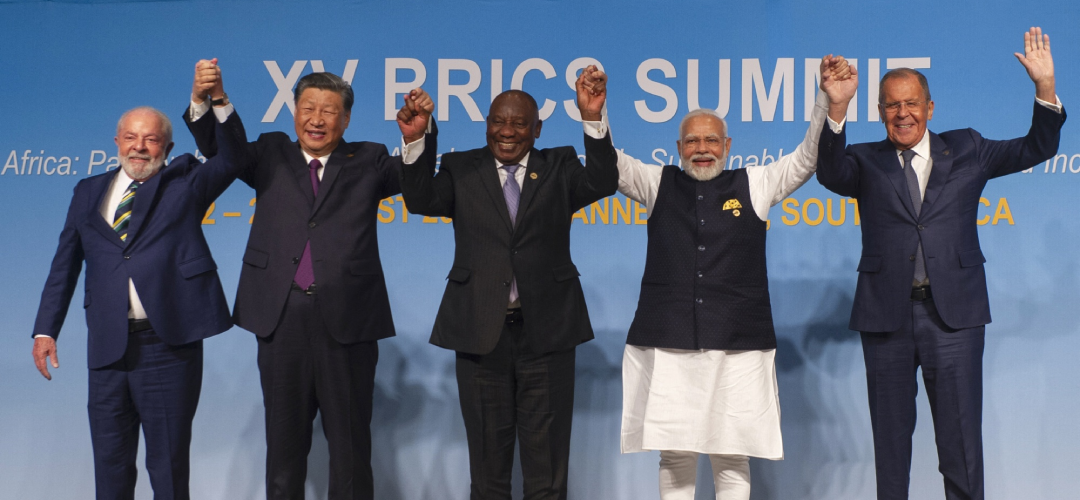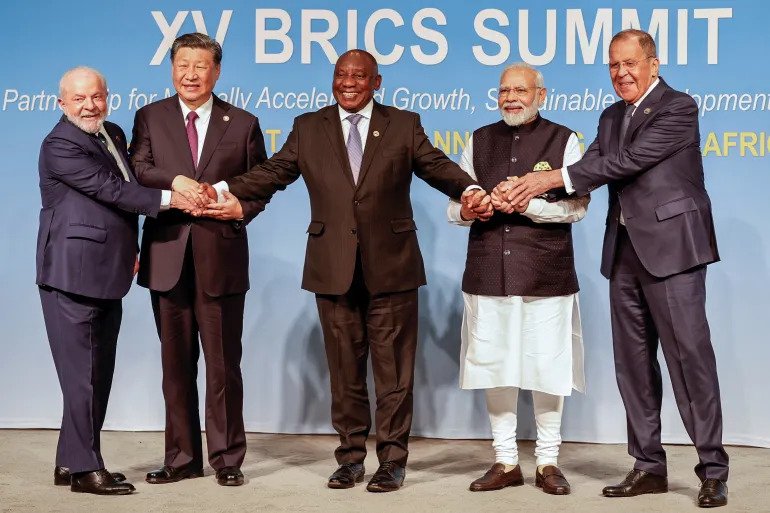New Entrants to BRICS: Worthy Candidates?
September 1, 2023 | Expert Insights

Multilateralism is an old concept in international politics. It has been tried in various ways through different permutations and combinations. The target countries have always been those from the developing world, while the Global North held the remote. Intentions behind these formations have also differed. Today, the Global South has much greater weightage in world affairs than ever before and is determined to press home the advantage.
At the 15th BRICS Summit held recently in the South African capital, Prime Minister Modi of India, President Lula of Brazil, President Ramaphosa of South Africa, President Xi of China and Russian foreign minister Lavrov, representing President Putin, acquiesced to accept the new members into the grouping.
Each of the new entrants to BRICS bring something unique to the table. Oil-rich countries like Saudi Arabia and UAE are there. Egypt has a strategic location in the Indian Ocean and is the most populous Arab country. Iran is trying to turn a new leaf, and even though its economy is weak, it has huge possibilities with oil and gas and a young population. Ethiopia is also strategically situated in the Horn of Africa. Argentina is a behemoth in the Latin American world.
Al Jazeera did not exaggerate when it called it "a wall of BRICS". The official joining date has been set for January 2024.
Background
BRICS, with its five original members, came into being in 2010. The original intentions of this entity were quite modest in nature. It was mainly a consultative body. At the annual summits, joint declarations were released, and that was it.
Slowly, certain institutional arrangements began to emerge. These include the New Development Bank and the BRICS Contingent Reserve Arrangement. Both empowered BRICS with financial muscle that was lacking earlier. It started to move away from being just another global talking shop with no actual powers to a credible multilateral forum. A BRICS payment system has also been instituted.
Then, the world order was turned turtle first by the pandemic, followed in quick succession by the war in Ukraine. Amidst all the chaos and confusion, China has risen, engendering a new cold war with the U.S. As China and Russia, the big boys on the BRICS, struggled to get out of control of the West imposed by the dollar regime and the latter's stranglehold on IMF, World Bank, etc., a change was a natural outcome.
According to Chinese President Xi Jinping, the bloc’s most stalwart proponent of enlargement, “This membership expansion is historic. It shows the determination of BRICS countries for unity and cooperation with the broader developing countries”.

Analysis
This expansion is not just about numbers. Instead, it is about sending a message, especially to the West. The U.S.-led West is totally focussed on the war in Ukraine to the detriment of the other issues. So, it is the responsibility of other countries to step up their game.
But this is also not just some altruistic, do-good feeling that has led to this significant extension; cold geopolitics is also at play. Clearly, the American USP as a trusted security and economic partner is waning, and its erstwhile partners want to secure their future with alternatives that are closer to home and more likely to resonate with their concerns.
Each of the new members has different reasons for joining BRICS. A major focus has been on the West Asian and North African regions. With terrorism as a threat receding from its horizon, the West has disengaged from this region. Countries of this region, which had hoped that the U.S.-led West would be a permanent ally by their side, feel abandoned and disappointed. The top among these countries is Saudi Arabia. The Riyadh-Washington alliance is decades old and has weathered many storms. Now, under Crown Prince Mohammed bin Salman Al Saud (MBS), the dynamics of this relationship have changed. The Saudi client state sees space to act beyond Washington's shadow. This was evident when, under Chinese mediation, Riyadh and Teheran agreed to re-establish full diplomatic relations. Apparently, the U.S. was blindsided by this move while China not only earned international applause but also won many lucrative contracts for Chinese entrepreneurs in Saudi and Iranian economies.
As regards Teheran, being included in the group was a big diplomatic victory, considering that for the better part of the last eight months, the country has been torn apart by widespread civil disturbance and state violence, especially against women. Apparently, Beijing and the Kremlin did not consider Iran's questionable human rights record an obstacle and India, Brazil and South Africa concurred.
UAE, another rich West Asian nation, has always been progressive in its approach, and its immense wealth and influence in the region make it valuable to BRICS. As per Bloomberg, as one of the few countries to manage over $1 trillion in sovereign wealth capital, UAE represents a potentially deep-pocketed contributor for the NDB, the BRICS bank set up to lend to development projects in emerging markets. The Emirates believes in diversification, both for their wealth and strategic relations and has close economic and security ties with India and China. India has also gained from its cooperation with the UAE on terrorism. So, this new member of BRICS will be an add-on for New Delhi.
Egypt has been placed in the North African category. It is opined that the Egyptians have ambitions for global governance and see membership as a way of exercising leadership and achieving their global ambition. Egypt, under President Sisi (in power since 2014 and now allowed by the parliament to run for a third term in 2024), has also been doing a course correction. Sole dependence on Washington as a net security provider is no longer possible for Cairo. It has strong relations with Vladimir Putin’s Russia. India, too, has emerged as a major partner of Egypt. There is a strategic partnership agreement between New Delhi and Cairo, underscored by the frequent exchange of visits at the highest levels. India can count on another friend in this new member of BRICS.
The two remaining new members are Ethiopia and Argentina. The former has been chosen with a lot of judicious thought. It is one of the fastest-growing economies on the African continent and could act as an engine of growth, provided it can put its fractious house in order. On top of this, the headquarters of the African Union is also located in the Ethiopian capital Addis Ababa. The inclusion of Argentina was championed by Brazil, China and India.
Does this enlargement of BRICS signal a new dawn for the Global South? Will a new multilateral pole finally emerge in the world? The indications are that hopes should not be held at such a high level. BRICS today is certainly much different from what it was ten years ago. Still, it has a long way to go before it can claim to speak for the Global South.
More than 20 nations from the Global South had formally requested to join ahead of the summit. In all probability, Indonesia would have been included if it had not asked for a deferment of a year or two.
None of the countries that have joined have been included because they are weak or need help. Rather, the value that they bring to the table, whether geo-strategic, military or economic, has allowed them to secure the coveted spot. Most of these countries are dictatorships. Concerns for the masses of the Global South are not high on their priority list. Regime survival is. BRICS is now a successful brand name more than anything else. It would be foolish not to hitch a ride on this bandwagon to improve one's legitimacy.
For India, this expansion is not a cause for concern. Gulf supporters of Pakistan are now in the BRICS. This is beneficial for New Delhi. BRICS has become another forum to work with these countries on counter-terrorism and isolating Pakistan. Islamabad is watching this closely. It has not made a formal request to join BRICS because it knows it does not have a chance as long as India remains vexed with it. All it can do is rue from the sidelines.
A major component of this expansion has been the focus on energy-producing countries. Some have even called this new arrangement “BRICS+OPEC”. This is important. The Russia-Ukraine war has shown the volatility of world energy markets. Western sanctions on Moscow have added fuel to this fire. Out of the original members of BRICS, only Russia is an energy producer. The rest of the non-energy-producing original members realised they had to hedge their bets to counter the uncertainty in energy prices. What better way to do this than to actually bring in the major energy-producing countries within the fold of BRICS ? The energy producers also understand one thing. Their main markets are India and China. So, both demand and supply clicked together to bring these countries into BRICS.
What should the United States make of this new look BRICS? From now on, will it have a new international body to deal with in international fora?
Commentators on both sides of the Atlantic have been rather dismissive of this fresh development, claiming that the differences between the member states and their internal problems are so vast (China and India are in a perpetual state of conflict, Russia mired in a debilitating war, Saudi Arabia and UAE staring at the demise of fossil fuel, and Brazil and China facing unprecedented economic downturn), that it will be nothing short of a miracle that BRICS could replace the IMF or the World Bank. There is no way the Yuan, the Ruble or even the Indian Rupee can replace the dollar at this juncture as a global reserve currency.
Assessment
- Every global organisation eventually grows. In this respect, BRICS is not an exception. The good news is that despite the differences between the original BRICS members, the organisation has endured and now is on the cusp of a re-birth.
- With more economically agile members now part of the bloc, optimism pervades the BRICS despite its dismissal by the West.
- Future expansion is very much on the cards, which could further empower the organisation. But more important is how the primary members navigate this enlarged forum, overcoming their mutual suspicions to give substance and direction to the enterprise sooner than later.








Comments